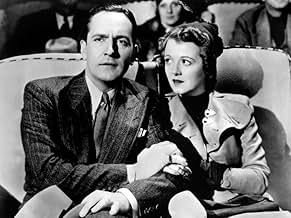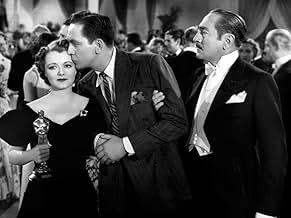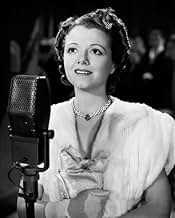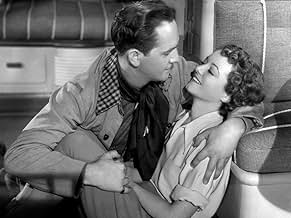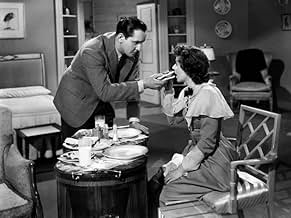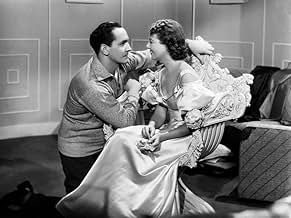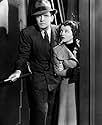IMDb RATING
7.3/10
12K
YOUR RATING
Young Esther Victoria Blodgett comes to Hollywood with dreams of stardom and achieves them only with the help of alcoholic leading man Norman Maine, whose best days are behind him.Young Esther Victoria Blodgett comes to Hollywood with dreams of stardom and achieves them only with the help of alcoholic leading man Norman Maine, whose best days are behind him.Young Esther Victoria Blodgett comes to Hollywood with dreams of stardom and achieves them only with the help of alcoholic leading man Norman Maine, whose best days are behind him.
- Won 1 Oscar
- 7 wins & 7 nominations total
Guinn 'Big Boy' Williams
- Posture Coach
- (as Guinn Williams)
Jean Acker
- Woman at Preview
- (uncredited)
Eric Alden
- Niles' Assistant
- (uncredited)
Irving Bacon
- Station Agent
- (uncredited)
Jane Barnes
- Waitress #1
- (uncredited)
Vince Barnett
- Otto
- (uncredited)
Clara Blandick
- Aunt Mattie
- (uncredited)
Featured reviews
A young country girl named Ester Blodgett (Janet Gaynor) arrives in Hollywood filled with dreams of becoming a famous movie starlet. However, she gets nowhere until she's noticed by famous movie star Norman Maine (Fredric March), a performer on his way down in terms of popular appeal. The two fall in love but just as Ester's star, under the stage name Vicki Lester begins to rise, Maine's begins to fade.
The best thing about this film is the performance given by Fredric March as actor Norman Maine. He nails the inner emotional turmoil going on inside his character and makes him always sympathetic to the viewer even as Maine falls in and out of sobriety. It's Maine's character that proves most interesting to the viewer here as March completely steals the film away from star Janet Gaynor.
Gaynor doesn't prove quite as appealing or convincing in her lead role as Ester Blodgett/Vicki Lester and honestly it's hard to see why the public should favor her so. Maybe this was to symbolize the fickleness of the public in that they should prefer a pretty new face over a talented older one. Who knows? Nevertheless Gaynor just doesn't ever prove as appealing here in her role as she should.
The best thing about this film is the performance given by Fredric March as actor Norman Maine. He nails the inner emotional turmoil going on inside his character and makes him always sympathetic to the viewer even as Maine falls in and out of sobriety. It's Maine's character that proves most interesting to the viewer here as March completely steals the film away from star Janet Gaynor.
Gaynor doesn't prove quite as appealing or convincing in her lead role as Ester Blodgett/Vicki Lester and honestly it's hard to see why the public should favor her so. Maybe this was to symbolize the fickleness of the public in that they should prefer a pretty new face over a talented older one. Who knows? Nevertheless Gaynor just doesn't ever prove as appealing here in her role as she should.
This is perhaps my favorite movie from the thirties. The writing, the acting, the directing, the music are virtually perfect. It is a rare kind of movie. The dialogue is sharp, smart, witty, compassionate, mature and incredibly contemporary. It could have been written last week. It is not afraid to deal with real life: alcoholism, drunk driving, failure, success, suicide. The characters are real. The drama is firmly anchored in real life. The writers are obviously good people who feel and think deeply. This movie was blissfully free from the usual contrived plots. What a breath of fresh air! The music alone makes it worth HEARING again and again.
I loved the fact that the movie didn't try prove anything. It just tells a story in an esthetically satisfying manner. It is of the same high quality as "The Best Years Of Our Lives". I haven't seen subsequent versions, but they cannot possibly be as good.
This the the most wonderful homage Hollywood ever paid to itself, to all those ordinary folks who became stars, or who valiantly tried and failed, or whose goals were more modest, and who achieved fulfillment behind the scenes.
This is the Hollywood epic standing proud and tall, and it is impossible not to shed a tear of admiration and affection.
I loved the fact that the movie didn't try prove anything. It just tells a story in an esthetically satisfying manner. It is of the same high quality as "The Best Years Of Our Lives". I haven't seen subsequent versions, but they cannot possibly be as good.
This the the most wonderful homage Hollywood ever paid to itself, to all those ordinary folks who became stars, or who valiantly tried and failed, or whose goals were more modest, and who achieved fulfillment behind the scenes.
This is the Hollywood epic standing proud and tall, and it is impossible not to shed a tear of admiration and affection.
Fredric March gave a magnificent performance, probably the best of his career, as Norman Maine, the actor whose career is in the descendant as that of his wife, Vikki Lester, is in the ascendant in this, the first 'official' version of "A Star is Born", (the 1932 film "What Price Hollywood" roughly told the same story). March displays just the right degree of brashness, of knowingness, and a combination of ego and a real actor's almost complete lack of ego. It's a miraculous piece of work.
As Lester, Janet Gaynor is touchingly blank but the star quality she is meant to display seems conspicuously absent; (in the 1954 musical remake Judy Garland was almost too much a star). It seems inconceivable that she could eclipse March on screen (even with his drinking). If Lester is a star and possibly a great actress Gaynor keeps the secret to herself.
The script for this version was partly written by Dorothy Parker and Alan Campbell and it shows. It's an acerbic and, at times, savage movie about the movies, quite cynical for a major studio picture of it's day. It is very well directed by William Wellman who draws first-rate performances from the supporting cast, in particular Lionel Stander as a heartless, slime-ball studio hack. This remains the best of the three versions to come thus far.
As Lester, Janet Gaynor is touchingly blank but the star quality she is meant to display seems conspicuously absent; (in the 1954 musical remake Judy Garland was almost too much a star). It seems inconceivable that she could eclipse March on screen (even with his drinking). If Lester is a star and possibly a great actress Gaynor keeps the secret to herself.
The script for this version was partly written by Dorothy Parker and Alan Campbell and it shows. It's an acerbic and, at times, savage movie about the movies, quite cynical for a major studio picture of it's day. It is very well directed by William Wellman who draws first-rate performances from the supporting cast, in particular Lionel Stander as a heartless, slime-ball studio hack. This remains the best of the three versions to come thus far.
this is the first version of this movie made,and the only version i have seen so far.i liked it.i thought it was touching and ironic,and also tragic.it basically tells what the movie business can do to you,and the sacrifices that are made.it also shows how disposable the industry and the people in it are.as long as you are the flavour of the week,everything seems fine.but when you're no longer useful,reality hits and things can come crashing down.that's what basically happens in this story.it's an indictment(ironically)of the movie industry,however subtle.regardless,i thought it was well done.the acting by the tow leads,Janet Gaynor,and Frederic March,as well as the supporting performances,are terrific.i also thought the writing was very good,and the movie flows very well.for me,A Star is Born gets an 8/10
Janet Gaynor plays Esther Blodgett beautifully, a girl who leaves for Hollywood with dreams of film magazines and the blessing of her granny. Once there she finds it tough-going until meeting Norman Maine (Fredric March) at a party. We've already seen Norman drunk at a theatre but here he charms Esther and actually gets her into the movies before marrying her and watching his own career crumble. March is excellent in this, and the look of the film is surprisingly modern with its lovely technicolor and gadgets (I particularly like the shower in the motor home Esther and Norman take on honeymoon). Esther's move to become star Vicki Lester, Oscar-winning actress, is unbelievable but as her real-life tragedy unfolds, compelling. And who can stay dry-eyed at the end? Remade with music and Judy Garland in 1954 (very well) but this first version is a jewel amongst other 30s classics.
Did you know
- TriviaThe first all-color film nominated for an Academy Award for Best Picture.
- GoofsThe Night Court Judge refers to the "commonwealth" of California, but California isn't one of the states with commonwealth status. The judge should have referred to the "state" instead.
- Quotes
Grandmother Lettie: If you've got one drop of my blood in your veins, you won't let Mattie or any of her kind break your heart, you'll go right out there and break it yourself.
- Alternate versionsAlso available in black and white
- ConnectionsEdited into What's Cookin' Doc? (1944)
- SoundtracksCalifornia, Here I Come
(1924) (uncredited)
Music by Joseph Meyer
(variations in the score as Esther arrives in Hollywood)
Details
- Release date
- Country of origin
- Language
- Also known as
- Nace una estrella
- Filming locations
- Production companies
- See more company credits at IMDbPro
Box office
- Budget
- $1,173,639 (estimated)
- Runtime
- 1h 51m(111 min)
- Aspect ratio
- 1.37 : 1
Contribute to this page
Suggest an edit or add missing content


